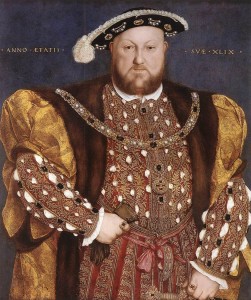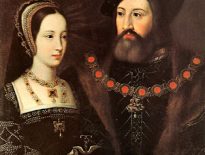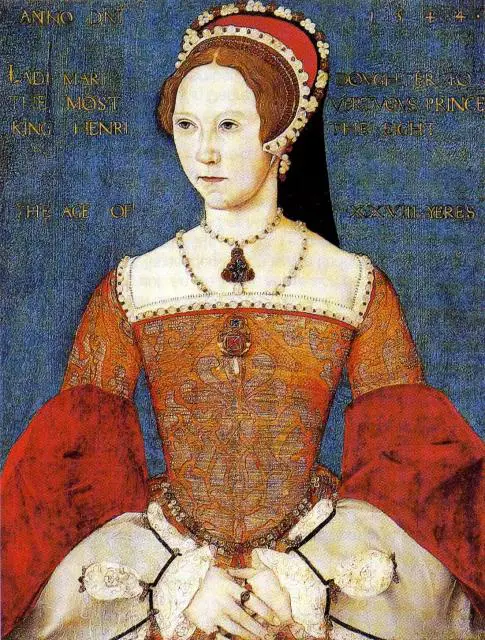 Thank you to Ana for asking "Why did Henry VIII get so fat? Was he really obese because he ate too much? Or because he was ill?". Here is Kyra Kramer's answer:
Thank you to Ana for asking "Why did Henry VIII get so fat? Was he really obese because he ate too much? Or because he was ill?". Here is Kyra Kramer's answer:
Henry was a man of large appetites, in so many ways. Until he was in his late 30s, he was an Adonis and Olympic-level athlete, and he ate to match the calorific needs of his muscular, 6'2" body. Like many athletes, he continued to eat this way even when middle age slowed down his metabolism, meaning that while he still rode and jousted as much as ever, he was getting a bit thick in the middle. We've all, I believe, seen this happen to formerly strapping men. They call it the "dad jeans" phase in America; when men start wearing jeans a little bigger, a little looser, and with a little more room in the backside. They are by no means obese, but they are no longer the ab-showing gods of their youth.
That was the stage Henry was in when he had his terrible jousting accident in January of 1536. After the accident, he never jousted again. His legs had become too weak (either from the osteomyelitis-related ulcers or from McLeod's syndrome) to hold himself into the saddle when a lance struck him. However, he did still ride long hours almost every day in hunting, and while he remained an equestrian, his girth remained in check. Sadly for the king, the ulcers on his legs began to be too painful to ride or to even move around easily. In a relatively short time period Henry changed from a sportsman to a near-invalid.
Contrary to popular belief, it is not being fat per se that makes you ill; it is being sedentary that kills you. You can be up to 'morbidly' obese and in excellent health if you are getting regular exercise, even if it is mild to moderate exercise. In Henry's case, the more sedentary he became, the fatter AND sicker he got. A lack of exercise probably caused him to develop Type II diabetes and heart disease as well. As he gained excess fat and his muscles deteriorated from lack of use, it made it harder for him to move, which meant he got even LESS exercise, which in turn meant he got MORE ill and obese. It was a vicious cycle that killed him only 11 years after his last jousting accident.
For more details on his health, and explanations of the various maladies he may have had or probably didn't have, I summed them up in Henry VIII's Health in a Nutshell, which you might enjoy reading.
 Kyra Cornelius Kramer is an author and researcher with undergraduate degrees in both biology and anthropology from the University of Kentucky, as well as a masters degree in medical anthropology from Southern Methodist University. Her work is published in several peer-reviewed journals, including The Historical Journal, Studies in Gothic Fiction, and Journal of Popular Romance Studies. She is also a regular contributor to "Tudor Life Magazine", the magazine of the Tudor Society.
Kyra Cornelius Kramer is an author and researcher with undergraduate degrees in both biology and anthropology from the University of Kentucky, as well as a masters degree in medical anthropology from Southern Methodist University. Her work is published in several peer-reviewed journals, including The Historical Journal, Studies in Gothic Fiction, and Journal of Popular Romance Studies. She is also a regular contributor to "Tudor Life Magazine", the magazine of the Tudor Society.
Kyra's books include Blood Will Tell: A medical explanation for the tyranny of Henry VIII, Henry VIII's Health in a Nutshell, Edward VI in a Nutshell, The Jezebel Effect: Why the sl*t shaming of famous queens still matters and the novel Mansfield Parsonage.



A number of things would have combined to a) make Henry fat and b) affect him physically but his leg accident would have kick started the chain of events, followed by a lack of exercise and increased eating. However, contrary to popular myths there was not copious amounts of food eaten by the King. A number of dishes were brought and you chose what you wanted for each course, more than we would consider normal, but not huge mounds as this was not polite. You may also be serving several people at once but Henry also comfort ate at times and there were several occasions when he was totally inactive as his ulcers clogged up and he was ill and not able to do anything. He suffered from depression and we know he withdrew from life at these times. He tried to keep active by riding, but he could no longer train or joust or dance. Henry must have felt he was trapped by his body at times and longed for his former self. We don’t know for certain if he had all of the accompanying pathology but it is a high probability. Interesting speculation though.
Having seen my husband lose a lot of weight in hospital and then put it back on plus more because he has to eat a high protein, high salt and low fibre diet as well as pasta and starch being actually the best as binders with his illeosteomy, I have to make certain he keeps fit to balance out and burn calories. I am on the opposite diet so shopping is great fun. I walk as much as possible. He is more active now, so he is losing weight again, but he is also carrying probably one stone in hernia. It is a real balancing act and I try to get him to eat pasta and rice rather than pastries and pies but it isn’t always possible, especially with a Sayers on the corner. Since his illeosteomy he has had to get moving again because had he remained still he would have ballooned in weight as from a healthy point of view he is eating the wrong stuff, but can’t eat much of the right stuff. I think I actually appreciate what Henry must have gone through during the final eight years of his life as I struggled when I first had a bad accident and couldn’t walk for eighteen months. It can’t have been easy for him to accept either as he had been a very active man and sportsman and I think he was depressed at times.
Why did Henry VIII get so fat
This was definitely written by fat people, what nonsense….
He was a gluton and over ate terribly, and clearly developed diabetes, the etiquette of eating little came a lot of years after.